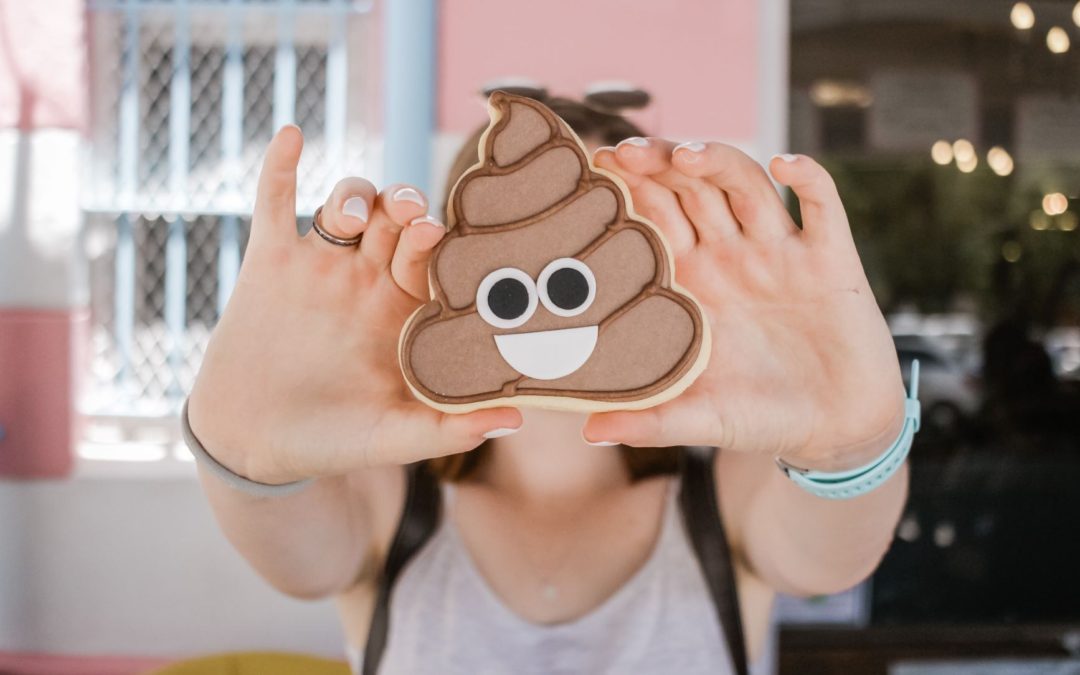While poop may not be a topic you regularly discuss with others, it is important to know that what you deposit in the toilet bowl can actually tell you a lot about your current health.
You should be taking a peek into the bowl after each bowel movement to get a sense of its color, texture and shape.
Your poop (stool) is an important clue to your overall digestion and health. Your poop can reveal serious signs of infections, digestive problems, and even display early signs of cancer.
This blog should give you the “scoop on poop” and will hopefully inspire you to pay attention to how often you go, how long it takes you to go, what your poop looks like and even what it smells like. In other words, get to know your poop! And I hope this blog will inspire you to take preventative action today to help maintain the health of your colon.
So What is Poop?
The consistency of poop is about 75 per cent water by nature, while the other 25 percent consists of undigested fibre, both dead and live bacteria, along with mucus and other dead cells.
Normal bowel movements will vary for each person. This will depend on what is going on with your diet and lifestyle habits. You can consult the Bristol Stool Chart to see the range of shapes possible. You should be aiming for poop that resembles number 3 or 4 as these types of bowel movements are considered normal.
Small, hard lumps or pebble like stools can be hard to pass and are indicative of constipation. This is because the poop is passing through your system too slowly. This type of poop may be helped by drinking more water and by adding more fiber to your diet. Similarly lumpy, log-shaped, hard stools can also indicate constipation.
If you are constipated then you may have difficulty passing stools, have a feeling of incomplete emptying, have painful or strained bowel movements, and of course will pass those hard stools with reduced frequency.
Ideally you are looking for log-shaped stools with a few cracks on the surface that are easy to pass. Or a bowel movement that is smooth and almost snake like, also easy to pass. These are both considered as a normal bowel movement.
Then we can also have soft stools like small blobs that are easy to pass, but these types of stools can mean that you are lacking soluble fibre which helps to create bulk in your stools.
At the opposite end of the spectrum would be the types of stools that will indicate diarrhea whether mild or more severe. These would include soft, mushy pieces of stool or having very watery stools with no solid pieces.
Most of us will experience diarrhea at some time in our lives with loose stools three or more times in one day. Acute diarrhea is diarrhea that lasts a short time, and usually goes away withing a few days. But if your diarrhea lasts more than a few days then this may be a sign of a more serious problem and should be checked.
How Often Should You Be Pooping?
You should be having at least one bowel movement per day. However, it is normal to have up to three bowel movements daily, one after each meal. Too often I come across clients who assume having one bowel movement a week is normal!
“Normal” bowel habits can differ for everyone. But you should be watching out for any big changes in your stools, particularly seeing black, tarry stools or stools with red blood. This should be checked out by a medical practitioner as any “extreme” change in texture, color, or frequency indicates there may be a health problem. Black stools can indicate something wrong in the upper digestive tract, while red blood in the stool can be indicative of something wrong in the lower digestive tract.
Also healthy stools should sink while floating stools can often indicate diet related issues such as fat malabsorption. Removing certain foods from your diet can often help. Floating stools can also be associated with celiac disease or chronic pancreatitis. Another sign to watch for is undigested food in your poop. This can indicate either not chewing your food enough, eating too fast, or can indicate a lack of stomach acid which helps break down your food before it enters the intestines.
Color and Smell Matter Too
The color of stools can vary and this can be from the foods you are eating. Have you ever eaten beets and noticed red in the bowl? Or if you eat a lot of greens then your poop will look green! So make sure to recognize this and do not let it alarm you. But if the color continues to not be normal, then you should get things checked. A normal stool color is brownish in color.
While we all know that poop does not have a pleasant smell, if the smell is very bad, that can be a sign of an infection, or a more serious digestive condition like ulcerative colitis, Crohn’s disease, or celiac disease.
While passing gas can be embarrassing, it is normal to have flatulence 10 to 18 times a day. This is most often due to the bacteria in your gut that are releasing gas as a by-product of breaking down the food you eat.
What is the Colon?
The colon, also known as the large intestine, is the last phase of the digestive tract before the broken down food leaves your body through the rectum. The colon is a long, tubular shape about 5 feet long which allows digested food to pass through before its ultimate expulsion from the body.
Prior to being released from the body this digested food goes through a few important stages. There is the extraction of any usable water and nutrients from the food matter, which is absorbed through the colon walls into the bloodstream for circulation throughout the body.
To properly care for your colon it is extremely important to pay attention to your diet and lifestyle as these will both affect the health of your colon. Eating processed foods for example are not beneficial because it takes a long time to try to digest because the body does not recognize processed foods, and puts stress on the system to find any nutrients within that type of food.
Eating processed foods can create undigested food that lines the colon walls for up to seven years or more! When our colon wall is caked in fecal matter this will impede our body’s ability to absorb and receive any essential nutrients leading to many different health concerns.
Steps to Create and Maintain a Healthy Colon
First take a look at the Bristol Stool Chart to see how your bowel movements compare. Remember you are aiming for number three or four on this chart. We know our bowel movements are affected by our diet and lifestyle.
You should be including plenty of plant based foods that are rich in both soluble and insoluble fiber. There are many foods that will contain both types of fiber such as vegetables, fruits, nuts, beans and seeds.
Insoluble fiber works as a cleaning agent for the intestines. Like a broom, it helps to “scrub” fecal matter from the walls of your intestines for elimination. Insoluble fiber creates more bulk in your stools and encourages more regular bowel movements.
Soluble fiber is transformed into a gel-like substance, which is digested by bacteria in the large intestine, releasing gases and a few calories. Soluble fiber can help lower cholesterol and maintain blood sugar levels.
Keep yourself hydrated by drinking more water to help flush out any toxins and those bulky stools. Water can help to create mucus in the colon allowing your bowel movements to be eliminated more easily.
If you incorporate more fresh fruit and vegetable juices, these also act as colon cleansers. These are often incorporated into various cleanse programs. Adding ground flax seed to your meals is another simple way to help create more fibre and bulk to your stools.
While it should be common sense, eating a balanced plant based diet and including plenty of hydration should encourage a highly functioning colon. These results will then carry over into other aspects of your overall health such as having more energy and even maintaining a healthy body weight.
The Importance of Keeping Your Colon Clean and Healthy
Hippocrates said “all disease begins in the gut”. There is more science today proving that all health does begin in our digestive tract. Therefore promoting and creating a healthy colon is a great step to take towards your overall health and wellbeing.
The colon is the waste management station of your body, think sewage system. Every cell and all tissues, even your major organs of detoxification such as the liver rely on a healthy, well operating colon to ensure that your body can release those unwanted toxins.
Remember your colon is the last stage of your digestive system where that food you ate is going to be excreted from your body after important nutrients have been absorbed into your blood stream for circulation to your body.
Your colon is very intelligent knowing what to absorb for the body’s use and what is toxic and unusable and needs to be excreted.
The Benefits of Doing a Colon Cleanse
There are several reasons why you will benefit from doing a colon cleanse at least on an annual basis. First the average person can have up to 7-10 lbs of old fecal matter inside their colon even if they poop regularly! When this poop accumulates it creates an environment for bad bacteria, parasites, yeast and viruses. And remember this accumulated matter can be in your colon for up to 7 years!
Did you know that the average person today is exposed to over 123 toxic chemicals each and every day! These toxic chemicals are not just in our food, but are found in our water, in the air we breathe, in the personal care products we apply to our skin and even stress will create toxic chemicals inside our body.
Therefore, if your colon is blocked, meaning the detoxification pathways are not working, then where do you think these toxins go? They continue to reside in your body. This then leads to many of the root causes of today’s chronic illnesses.
Here are just some of the general symptoms of an unhealthy or blocked colon; general malaise, fatigue, constipation, diarrhea, acne, sore joints and muscles, insomnia, brain fog, weight gain and yeast infections.
You should talk to your doctor before doing a cleanse, especially if you have a digestive disorder or other condition that is affecting your digestive system.
7-Day Fall Cleanse
After getting this “scoop on poop” are you ready to learn more about how to unlock the power of food to heal your body, prevent disease & achieve optimal health?
Stay tuned for my upcoming Fall Cleanse – Loving Your Immune System which will begin on Monday, November 4 . Your immune system relys on a healthy colon and according to Chinese medicine the fall season is related to your colon, your lungs and your skin.
During my 7-Day Love Your Immune System Fall Cleanse we will be focusing on these key areas to help clean out your colon, boost your immune system ready for the cold and flu season, and enhance the health of your lungs and skin.
Your Nourishing Nutritionist,
Lynne Bowsher

Nourishment for body, mind and spirit

7 Steps to Help Fight Stress and Fatigue
and step into a life of purpose
If you have been struggling with stress, fatigue or wanting more purpose in your life, download my e-book to get 7 steps towards turning your life around today!



 Hello! I’m Lynne Bowsher, a Certified Mind Body Nutrition Coach and graduate of Functional Nutrition.
I work with women who are struggling with stress, fatigue and who are looking for more purpose in their life.
My wish is to help as many women as I can become embodied and to embrace and love who they truly are.
Hello! I’m Lynne Bowsher, a Certified Mind Body Nutrition Coach and graduate of Functional Nutrition.
I work with women who are struggling with stress, fatigue and who are looking for more purpose in their life.
My wish is to help as many women as I can become embodied and to embrace and love who they truly are. 
Trackbacks/Pingbacks